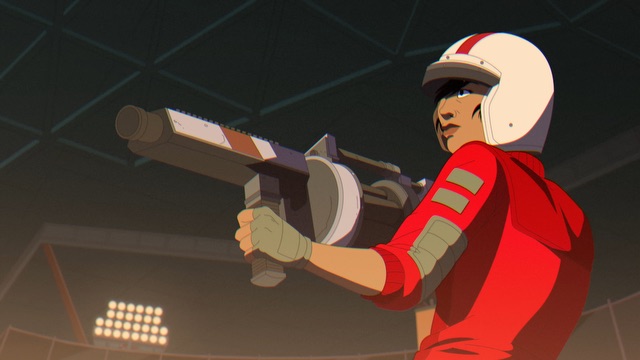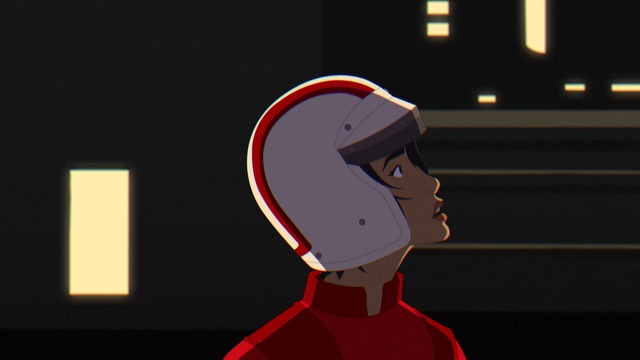Roll7’s Rollerdrome is decidedly more complex than the OlliOlli series that the developer is known for. This is a full 3D affair, complete with a gritty near-future background in which a corporatocracy controls the people through televised sporting spectacles. When the game was showcased in the July State of Play, it raised a lot of heads, and now we’re seeing if its blend of skating and shooting hits the ground rolling or wipes out.
Remember Rollerball?
Rollerdrome’s story segments definitely take the backseat to the rest of the game. It’s set in 2030, and the world is a corporate-run dystopia. You play as Kara Hassan, a rookie Rollerdrome player, and are tasked with making your way through the tournament bracket to become the champion.
The story is told in small sections between each round of the championship and is basically a generic anti-corporate yarn. Rollerdrome is televised to be a distraction from real-world problems, and people are starting to become rebellious. It never really goes anywhere and is little more than flavor to guide the game’s aesthetic.
The overall package feels like an homage to Rollerball (the 1975 film, not the god-awful 2002 remake). I can dig it, but I would have liked to have seen more complexity in the story. For example, having named teammates or rivals could have gone a long way toward bringing the world to life and given some opportunity for some dialog during the matches.
Skate or Die
The gameplay is a unique blend of third-person shooting ala Max Payne and Tony Hawk’s Pro Skater. Like in Tony Hawk, each level presents you with a list of objectives; you have to skate, shoot, and score your way through them. Complete enough goals, and the next level unlocks.
The game encourages you to switch between skating and pulling tricks and taking out foes well, and you’ll quickly find there’s a rhythm to it. You kill enemies to increase your score multiplier and then pull off flips, grinds, and spins to reload your weapons and increase your score. You have to find a balance between these two things to succeed, and they blend better than I expected.
There’s also a rock, paper, scissors aspect with your weaponry that keeps you on your toes. Each of the various enemy types has a particular weakness that you can exploit to take them out quickly. This is essential to both ending levels fast (which is often one of the objectives) and preventing foes from overwhelming you. This is especially true later in the game when it really starts chucking whole crowds of robots, riot guards, snipers, and shielded rocket troops at you.
Slowerdown
The biggest issue I had with Rollerdrome’s gameplay is that as unique as it is, it often feels too busy. The great thing about (most of) the Tony Hawk’s Pro Skater series is that once you get comfortable with how things work, you can enter a kind of trance. I always found it appealing that once you get into the groove, they’re really relaxing to play despite the need to constantly input commands to pull off tricks.
In contrast, Rollerdrome doesn’t let up, and the amount of attention needed makes it more frantic than relaxing. It’s not that it’s a hard game; it just doesn’t make the best use of the systems it riffs off of other games. The skating and shooting aspects sometimes felt at odds with each other, and this becomes more apparent the further you make it through the game.
Rollerdrome’s adaptation of shooting and skating is also relatively shallow. Because you constantly have to switch back and forth between the two, there’s not really any chance for either to have the depth you’d hope to see. Kara is never going to pull a 900 or a Kickflip McTwist. Likewise, the goons you’re fighting will never show any sense of self-preservation or behavior more complex than standing in place and shooting toward you or running toward you to be slaughtered.
Rollerdrome Review: The final verdict
Blending genres is tough, and Rollerdrome does an admirable job of fusing skating with shooting. The biggest issue is that it sometimes feels like too much, and I found myself wanting to do one or the other more than once. However, I did have fun, and I’d love to see this idea refined further in a sequel.
Unfortunately, the package ends up feeling a bit bare. The story is window dressing, and the gameplay is lacking in variety. The lack of multiplayer also feels like a missed opportunity. Without it, there’s not much replayability other than an online leaderboard.
-
Unique gameplay.
-
Interesting aesthetic.
-
Can be too much to handle in later stages.
-
Story is mostly window dressing.
-
Low replayability










